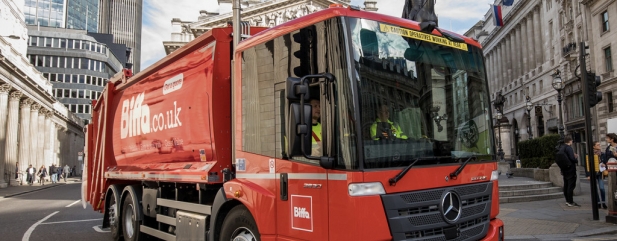Archived article
Please note that tax, investment, pension and ISA rules can change and the information and any views contained in this article may now be inaccurate.
Biffa makes a nice profit and its shares are cheap

In a world where many investors are obsessed with chasing fast growth stocks or quality companies with large cash flows, it can be easy to forget some of the less glamorous businesses despite many of them being very attractive investments.
We’d certainly categorise waste management group Biffa (BIFF) in the latter category. Now looks like a superb time to buy the shares, as we explain.
What does it do?
Set up by Richard Biffa in 1912 as a haulage company providing services to coal fired power stations in London, the group now collects, processes and recycles waste, as well as producing energy.
Biffa was acquired by utility provider Severn Trent (SVT) in 1991 and subsequently demerged in 2006 and floated on the UK stock market. Two years later it was taken over by two private equity groups.
The period 2008 to 2012 was terrible for Biffa as it struggled under the weight of significant debt and was too reliant on landfill at a time when the government was pushing up taxes and the UK was shifting focus to recycling.
The company responded by expanding its recycling operations, restructuring its debt and making lots of small acquisitions to increase its presence in the UK.
The private equity owners then commenced the first phase of exiting their investment by putting Biffa back on the London Stock Exchange in October 2016.
Impressive earnings revival
Pre-tax profit has recovered from a mere £1m in the financial year ending 31 March 2014 to hit £45.1m three years later.
On the same time scale, net debt to EBITDA (earnings before interest, tax, depreciation and amortisation) has gone from 5.2 to 1.9 times. To put that in context, most companies don’t like to go above 3.0 times. A figure above 5.0 would be unacceptable to most investors.
Stockbroker Numis now believes pre-tax profit will increase by 53% over the next three financial years to £69.2m. Such a growth rate would be very impressive when you consider Biffa is a boring old service company.
That’s where it gets very interesting. Biffa has plenty of scope to drive earnings over the coming years, according to chief executive Ian Wakelin. We often say ‘boring is beautiful’ at Shares when it comes to considering certain investments and Biffa definitely fits the bill.
The CEO is confident of Biffa trucks picking up more industrial and commercial waste per journey. ‘If we’re picking up waste from numbers 34 and 38 on a street; getting the waste business from number 35 as well, hypothetically speaking, doesn’t cost us anything extra, meaning we enjoy operational leverage’. Essentially the extra collection in that example would be highly profitable.
To maximise what it calls ‘route density’, Biffa either needs to win business from rivals, buy small operators and inherit their customers, pick up business from existing customers as they move property or benefit from new property construction.
Most of the acquisitions in recent years have been done on low earnings multiples, roughly 3.0 times enterprise value to EBITDA. Bargains on that scale are rare and so the Biffa boss says future acquisitions are likely to be done on higher multiples.
Industrial and commercial work accounted for 43% of EBITDA in the 2017 financial year. Picking up residential household waste is 15% of its EBITDA; contracts run for seven years and Wakelin says councils nearly always extend them for another seven years. The remainder of earnings come from energy generation (22%) and waste processing (19%).
‘Our collections are complex logistics operations,’ says Wakelin. ‘Smaller companies are finding it harder to compete with us.’
Waste collections are sent to a variety of processing facilities where Biffa tries to recover as much value as possible. This ranges from recovering sand from road cleaning which is sold to construction companies and food waste which is used to produce bio gas and, ultimately, electricity. It also extracts gas from its landfill sites.
New opportunities
The company believes the UK is failing to capitalise on a large amount of waste that could be burned in order to create energy. That’s why it is exploring the possibility of building two energy-from-waste plants in Leicestershire and Cheshire each costing £250m.
That is the type of opportunity available to Biffa now it has fixed the balance sheet; previously it wouldn’t have been able to consider them, says the boss.
Biffa has partnered with US specialist Covanta which would be the plant operator. Assuming 65% is obtained via project finance, that suggests Biffa and Covanta will each have to find £87.5m to get the plants operational.
‘We need to figure out the equity return and how it compares to other places we could invest money like more M&A or building other plants,’ reveals Wakelin.
With several high profile failures in the energy-to-waste sectors, such a move may trouble Biffa’s investors. Wakelin says the problematic plants were a result of using relatively unproven technology and that Biffa will only go down the tried and tested route.
He also hopes to take Biffa into the construction and demolition waste collection and processing space.
At 228.75p Biffa is trading on a mere 12.2 times forecast earnings for the year to March 2018. That’s far too cheap for a company in good health, forecast to pay a rising stream of dividends and with clear potential for earnings growth. Buy now.
Important information:
These articles are provided by Shares magazine which is published by AJ Bell Media, a part of AJ Bell. Shares is not written by AJ Bell.
Shares is provided for your general information and use and is not a personal recommendation to invest. It is not intended to be relied upon by you in making or not making any investment decisions. The investments referred to in these articles will not be suitable for all investors. If in doubt please seek appropriate independent financial advice.
Investors acting on the information in these articles do so at their own risk and AJ Bell Media and its staff do not accept liability for losses suffered by investors as a result of their investment decisions.
Issue contents
Big News
- Big news in the banking sector
- Gambling stocks in focus ahead of Government review
- Cobham appoints former Airbus UK chief
- MJ Gleeson is one of our top picks among housebuilders
- What next for investors after German elections?
- Central Asia Metals’ zinc move makes the stock higher risk
- UK hotel growth to decline in 2018

 magazine
magazine











